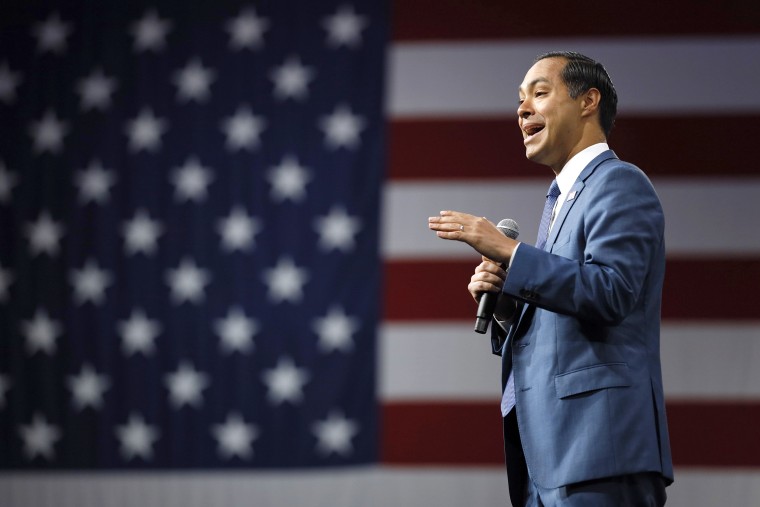Presidential candidate Julián Castro proposed on Thursday taxing inheritances of $2 million or more, raising the capital gains tax rate and providing a $3,000 per child tax credit to address wealth inequality and help working families.
The planhe dubbed "People First Economic Plan for Working Families" also calls for investing in child care, paid family and medical leave and implementing a $15 an hour minimum wage.
Unveiling the plan hours before speaking to the Working Families Party, Castro stated the plan “can ensure that the wealthy pay their fair share and then invest that revenue into relief for working families.”
“Families working hard to make ends meet shouldn’t pay more in taxes than the wealthiest earners. My new plan would put working families first: providing critical relief to families who count on a paycheck, and ensuring the wealthiest Americans pay their fair share," Castro said in a statement.
Castro said under his plan, 99 percent of Americans would see their taxes go down or stay the same.
“We know today that a lot of families are working and not getting ahead the way they ought to be and the way they want to,” Castro said.
As he does with several of his other policy plans, Castro drew on his own background in creating the proposal. Castro’s grandmother worked as a maid, a cook and a babysitter, raised his mother on her own and also helped care for him and his twin, Rep. Joaquín Castro.
Castro said his grandmother couldn’t pass on wealth but did pass on an “inheritance of hard work.”
“This plan is for the working families of America just like mine,” he said in a release on his plan. His plan includes repealing President Donald Trump’s tax plan.
Castro said the inherited wealth tax and the “wealth inequality tax” he’s proposing are unique to his plan compared to plans offered by other Democratic candidates in the race.
Under his inherited tax plan, the first $2 million of an inheritance would be tax free, but after that a tax would be imposed. The tax would replace the gift and the estate tax and would affect .27 percent of heirs, he said.
“This would basically be analogous to taking the estate tax back to 2009 levels,” Castro said.
Castro’s goal is increase again the number of estates that are covered while providing a significant source of revenue, his campaign staff said. Castro projects the inheritance tax would raise more than $250 billion over 10 years.
According to Castro’s campaign, the share of heirs covered by inheritance taxes has gone from 2 percent of estates in the year 2,000 to 1.9 percent before Trump’s tax bill was implemented and today covers just .06 percent of estates.
“The implications go beyond revenue as well. It’s about income inequality, concentrated wealth and political power,” his campaign said.
Castro also is proposing to raise the capital gains rate to match the marginal income tax rate.
He also proposed a “wealth inequality” tax, that he said would tax income from capital in the same way as the earnings of a school teacher.
In that plan, he would use what is known as a “mark-to-market” system to tax the capital gains of the richest one-tenth of 1 percent of asset holders, whose assets are worth about $40 million.
Mark-to-market is a way of taxing an asset at its current market value. A capital gain is earned when something is sold for more than what was paid for it.
He would raise the capital gains tax rate to 40 percent for individuals who earn $400,000 or more.
“Today, labor income is taxed at the end of every year, whereas income from investments, wealth, and capital are not. Multi-millionaires and billionaires who rely primarily on investment income receive different treatment under the law,” Castro said in a statement.
Under his plan, wealthy individuals would pay taxes every year on investment income, regardless of whether they sell those investments. Non-public traded assets would be treated similarly, and taxed at the time of sale, with a charge for deferring tax until that time.
Castro wants to invest revenue from his tax proposal into providing relief for working and middle class families.
He called for a universal child credit of $3,000 per child for every family and an expansion of the Earned Income Tax Credit (EITC). Building on his proposal for universal Pre-K education, he proposed universal child care.
His plan calls for extending EITC to include more dependents, including non-working elderly grandparents and adult children who are disabled. His staff said that proposal is meant to be about families “in ways that maybe other proposals are not.”
“Together, the new credit, pre-K education and child care will help us achieve a bold new goal to reduce child poverty by two-thirds,” he said in a statement.
Castro said in a phone call with reporters his plan to invest revenue in universal child care would be available to all families. His plan would cap at 7 percent the amount families would pay for child care, “so it would reach into the middle class,” Castro said.
While he was San Antonio mayor Castro got voters to approve a one eighth-cent sales tax increase to expand quality full day pre-kindergarten in the city.
“I believe we need to make sure that every child can have good child care and yet a great early education,” Castro said. “I also believe, as a matter of politics, that making these programs available to middle class and upper middle class families is a powerful way to create a strong coalition to get them done and that we ought to do that.”
Follow NBC Latino on Facebook, Twitter and Instagram.

